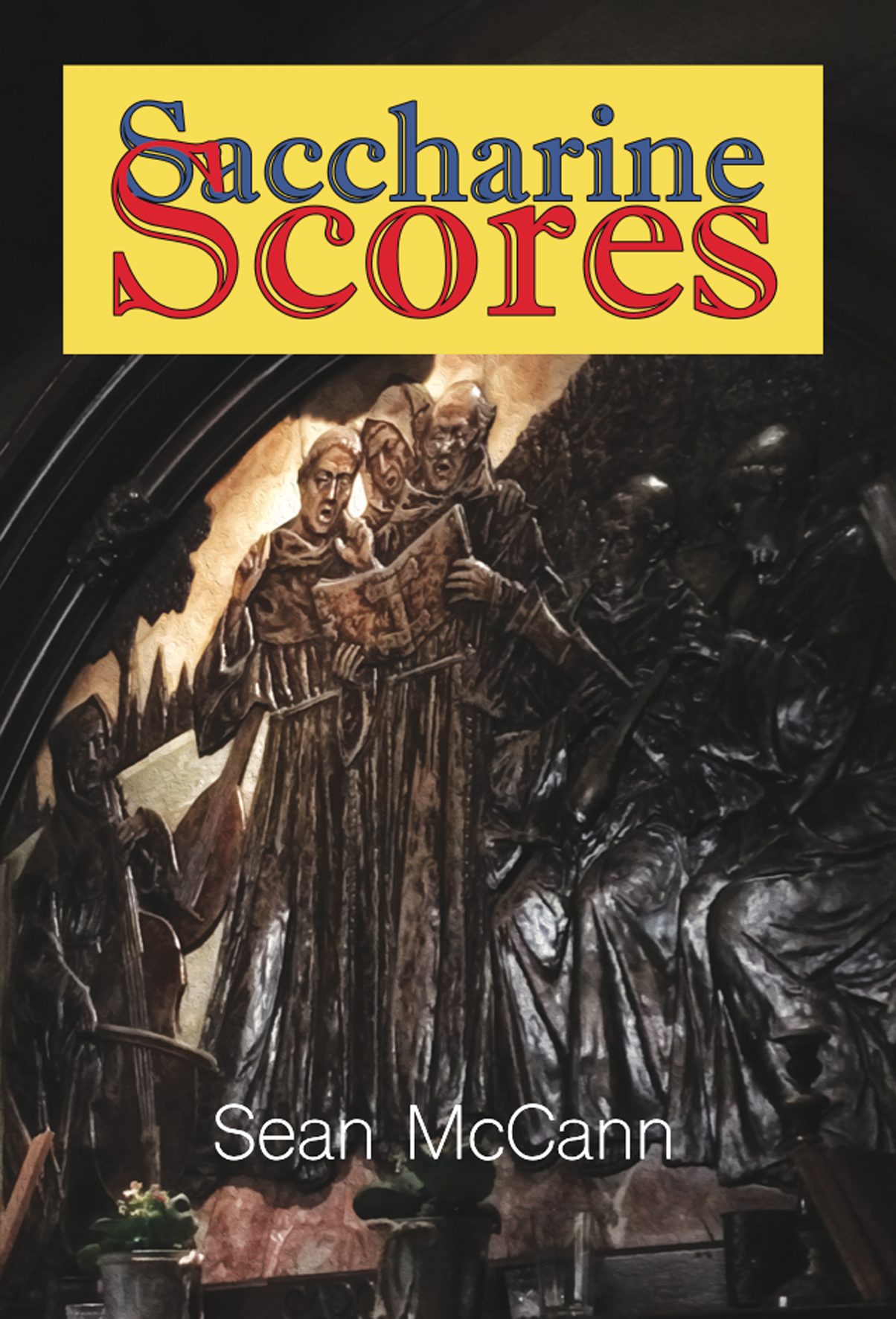Sean McCann, "Saccharine Scores"
 Sean McCann celebrates the 50th release of his endlessly evolving Recital Program imprint with a major new work of his own, combining his dual love of literature and music into a unique album/book pairing. Of the two halves of the work, the book takes more of a supporting role, providing personal insights about the birth of each piece as well as the accompanying texts that appear throughout the album in often unrecognizably abstract or altered form. The album itself is kind of a compilation of sorts, bringing together four thematically similar pieces that are a mixture of live and studio performances and new and previously released work. The two new longform pieces that elegantly blend together speech and orchestral composition are the true heart of the album, however, and they are what make Saccharine Scores a landmark release in McCann’s discography. Glibly put, this is the album that places McCann quite firmly into "Robert Ashley" territory rather than "Andrew Chalk" territory, but I was pleasantly surprised to find that his voice as a writer is every bit as distinctive as his talents as a composer.
Sean McCann celebrates the 50th release of his endlessly evolving Recital Program imprint with a major new work of his own, combining his dual love of literature and music into a unique album/book pairing. Of the two halves of the work, the book takes more of a supporting role, providing personal insights about the birth of each piece as well as the accompanying texts that appear throughout the album in often unrecognizably abstract or altered form. The album itself is kind of a compilation of sorts, bringing together four thematically similar pieces that are a mixture of live and studio performances and new and previously released work. The two new longform pieces that elegantly blend together speech and orchestral composition are the true heart of the album, however, and they are what make Saccharine Scores a landmark release in McCann’s discography. Glibly put, this is the album that places McCann quite firmly into "Robert Ashley" territory rather than "Andrew Chalk" territory, but I was pleasantly surprised to find that his voice as a writer is every bit as distinctive as his talents as a composer.
Given McCann's longtime working method of crafting, processing, and layering loops, the opening "Portraits of Friars" is something of a long gestating creative breakthrough and the culmination of a life's work.The piece, performed at the Third Edition Festival in Sweden earlier this year, was composed for an ensemble of ten and begins with most of the musicians reading evocative texts at a pace of their choosing.The texts are alternately strangely beautiful or eerily grotesque in an impressionistic way, unfolding as an enigmatic flow of colors, textures, sounds, and images that elude graspable meaning ("flies brown to green split jets of blood"), yet follow a sort of a dream logic.Notably, this is where the book plays a crucial role in the overall work, as the overlapping voices in the piece blur together into a largely incomprehensible swirl and the underlying poetry of McCann's writing is completely obscured.One by one, however, each of the musicians stops speaking and begins playing their instrument, weaving an elegantly bittersweet and dreamlike spell as languorous strings and angelic voices swell around the remaining voices.As it unfolds further, McCann adds another layer of hissing and garbled texture with tapes.It is all quite beautiful and also quite interesting to deconstruct, as McCann has essentially taken his loop-based aesthetic and extended the individual components until they no longer feel like loops, then injected a healthy degree of unpredictability and chance into the mix.There was no way for him to know when any of the musicians would stop speaking and start playing, so the way that the individual motifs intertwine and rub against one another was determined spontaneously and organically.
The other swooningly gorgeous epic on Saccharine Scores is "Pistons," a piece that began to take shape when McCann spent a few weeks in London in 2017.Much like "Friars," "Pistons" is a floating heaven of female voices, gently cascading piano melodies, and fluttering strings, but is a bit more hallucinatory and densely layered.That makes sense, as it is a studio creation, so McCann had plenty of time to perfect it even if he did not have the talent pool he had in Sweden.The other twist is that it more deeply explores McCann’s interest in unusual juxtapositions, which manifests itself in "Pistons" as a blurring together of the romantic and the mundane (the whole piece is built from an indecipherably murmured and sibilant recording of McCann recounting his various London meals).It is similarly impossible to tell what Celia Eydeland is sensuously singing in the foreground, but it apparently features recontextualized snatches of Baudelaire. In lesser hands, such a collision would feel like Dada-esque bit of indulgence, but McCann's intuitive sense of balance is unerring: the recitation of various foods is mutated and processed into a surprisingly effective textural foundation.Moreoever, once I learned of its actual content, it provided kind of an endearing window into McCann's headspace as well as a strong sense of place and time. It is an achingly beautiful and absorbing piece, easily ranking among McCann's finest work.
The remaining two pieces are also quite good, but they take very divergent paths from "Friars" and "Pistons."The first is 2014's "Victorian Wind," which was apparently McCann's first completely scored composition.It previously surfaced on the A Castle Popping LP, but its inclusion makes sense here, as it is a structural precursor to "Friars": the musicians were all given 10 motifs to play and were encouraged to choose the tempo and the number of repetitions for each.Unsurprisingly, it is a characteristically lovely web of tenderly intertwining motifs, but the lack of any vocal or text-based element makes it a bit less distinctive than the other pieces on the album.The bizarre closing piece "Passing-Ships," on the other hand, has no such problem, as a computerized female voice intones a numbered series of non sequiturs ("the lady opposes garlic on top of the dried calculator") over a gently rippling piano motif.It is arguably the least strong piece on the album, as it does not noticeably evolve at all, but it is a memorably surreal note to end the album on.It lies somewhere between fragile, warm bliss and lysergic magnetic poetry, which is not an oft-explored niche at all.
I wish I could remember who said it, but I remember once reading that a lot of bands get steadily less interesting as they become increasingly skilled at resembling the influences that they were trying to sound like all along: the most unique work tends to happen when an artist is still fumbling around and exploring.There are admittedly countless counter-examples of folks who have eluded that fate, but McCann seemed to be on a worrisomely slippery slope as his work became increasingly composed and orchestral: it is always disheartening to watch an artist I love start to sand away the rough edges that give their work its distinct character, even if the quality itself is improving.Happily, Saccharine Scores is a delightful surprise that dissipates all of my concerns, as McCann's recent neo-classical bent has fully blossomed into a fresh new chapter of singular and innovative work.This is quite a wonderfully strong and playfully experimental album from start to finish, easily standing as one of the best releases to date in McCann's voluminous discography.Beyond that, however, this is unique release for modern composition as a whole, inventively blurring together poetry, melody, spontaneity, and chance into something that is both novel and unconventionally personal.
 



